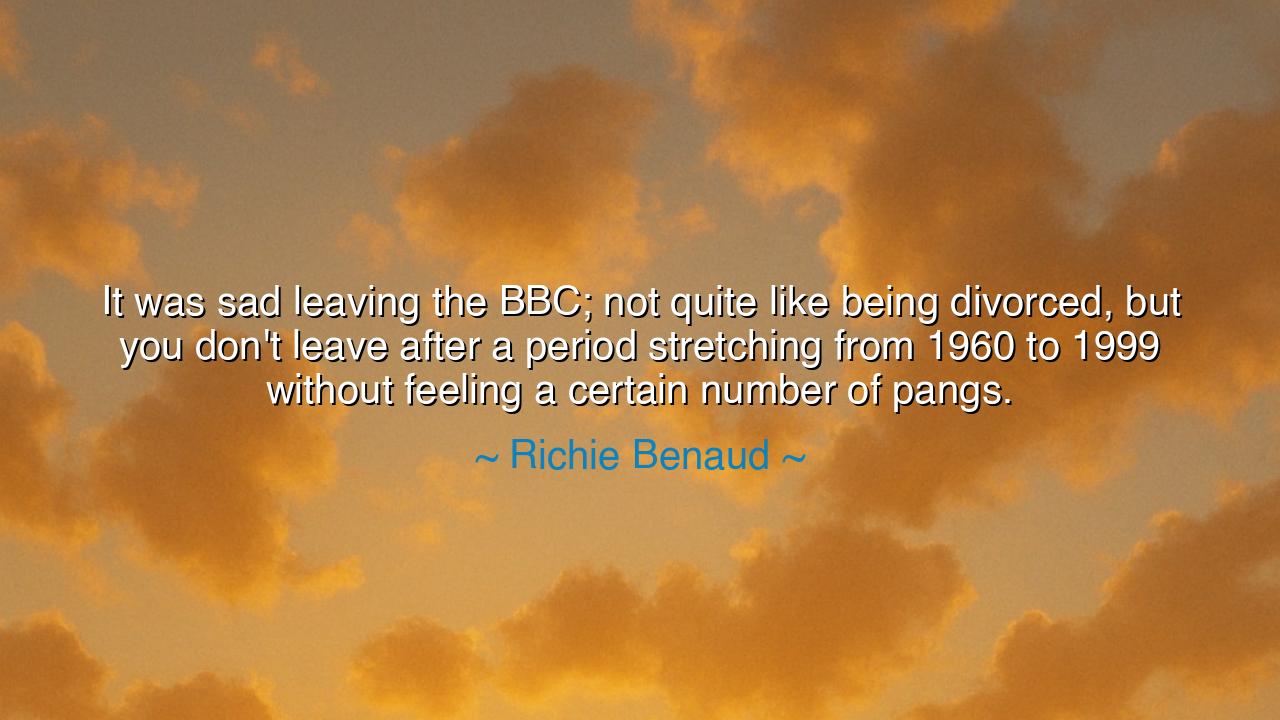
It was sad leaving the BBC; not quite like being divorced, but
It was sad leaving the BBC; not quite like being divorced, but you don't leave after a period stretching from 1960 to 1999 without feeling a certain number of pangs.






The words of Richie Benaud, “It was sad leaving the BBC; not quite like being divorced, but you don't leave after a period stretching from 1960 to 1999 without feeling a certain number of pangs,” reveal the ache of parting from a lifelong companion. They speak not only of a career but of a bond forged through decades, a bond that grew into part of his very identity. His years at the BBC were not merely employment, but a partnership, a shared journey through history, matches, and generations of listeners. To leave such a place is not a simple resignation—it is the breaking of a rhythm that has defined a lifetime.
The origin of this truth lies in Benaud’s extraordinary career. Once a cricketer of distinction, he became the voice of the game, his commentary calm, insightful, and filled with the wisdom of experience. From 1960 until 1999, nearly four decades, his presence on the BBC was steady, shaping the way millions understood and loved cricket. When he left, it was not the end of his life’s work, but it was the end of a sacred chapter, a farewell to the institution through which he spoke to the world.
The comparison to divorce is striking, for it reflects the depth of intimacy between a man and his life’s labor. Just as marriage is not merely an arrangement but a weaving together of two souls, so too Benaud and the BBC were woven into each other’s story. Their bond carried triumphs, disappointments, and countless memories. Though the parting was not filled with bitterness, it was nonetheless painful, for time itself had intertwined them.
History offers us many echoes of this truth. Consider Cincinnatus, the Roman farmer called to lead Rome in crisis, who, after victory, returned to his plow. His departure from public duty was not marked by bitterness, but by pangs of release from something greater than himself. Or recall Michelangelo, who when leaving certain commissions unfinished, confessed that it was like parting with a child. In each of these stories, as in Benaud’s, there is recognition that long devotion leaves a mark that cannot be erased without sorrow.
Yet within Benaud’s words there is also gratitude. He does not curse the leaving, nor diminish the years. Instead, he honors them by acknowledging the pangs, the sadness that is proof of love. For to feel sorrow at parting is to recognize the worth of what was shared. A life without such bonds would know no pain of leaving, but it would also know no joy of belonging.
The lesson for us is this: when you give yourself fully to a calling, expect both joy and sorrow at its ending. To devote decades to a labor, a relationship, or a cause is to bind your heart to it. One day, whether by choice or by necessity, you will have to let it go. The pangs you feel are not signs of weakness, but signs that you lived faithfully and with devotion.
Practically, this means we must embrace endings as part of the rhythm of life. When a chapter closes, do not scorn the pain; let it remind you of the depth of your investment. Speak gratitude for what was, rather than bitterness for its passing. And as Benaud did, carry forward the memories, the lessons, and the dignity of your time into the next chapter of your journey.
Thus, Richie Benaud’s words are more than the farewell of a commentator; they are a teaching for all generations: a life of devotion leaves both joy and pangs, and the pangs themselves are proof that the journey was worthwhile. To leave is sorrow, but to have belonged is blessing.






AAdministratorAdministrator
Welcome, honored guests. Please leave a comment, we will respond soon